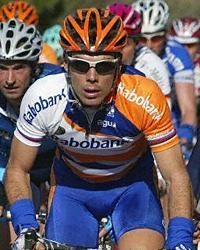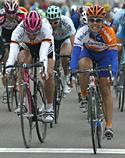
Recently on Cyclingnews.com |
An interview with Oscar Freire, February 23, 2004
Going for Glory

|
After two brilliant world championship wins in 1999 and 2001, Oscar Freire wants to relive his glory days once again. Cyclingnews' Hernán Alvarez Macías got the chance to speak with the quietly spoken Spaniard a few days ago after the final stage of the Vuelta Andalucía, where he finished second on two stages and eleventh overall.
Everyone knows that to become world champion is not an easy task, even for the most talented riders. But to become a two-time world champion is two times as difficult. This is why Oscar Freire deserves a place among the very best Spanish riders in recent years after winning in 1999 and 2001.
Freire is not as famous as Roberto Heras or Oscar Sevilla in his Spanish homeland. It may be because the Rabobank man prefers the single-day races to the longer tours. Or because his victories are not as important for the Spanish media and fans as a victory in the Vuelta. Whatever the case, Freire will aim for further glory in 2004, where he will be riding for victory in the World Cup, trying to defeat the defending champion Paolo Bettini, in the Olympic Games and also in the World Road Championships.
Cyclingnews: How are you doing at the start of another season?
Oscar Freire: Well, so far I'm doing fine. I think I'm finding form quite well in these first months of the year. I've already won in Mallorca and today I came second by two or three millimetres (Erik Zabel of T-Mobile took the fifth and final stage of the Vuelta Andalucía in Almería - Ed). I think I am feeling very well in order to compete in the most important races later on, that being the classics.
CN: Which are your goals this year?
OF: My objectives will be focused primarily on the Classics and the World Cup, the Olympic Games and the World Road Championships.
CN: Which are the biggest differences you have found riding on Spanish teams and non-Spanish teams?
OF: Most of all, the way of riding that is different. Non-Spanish teams prepare themselves mentally much better than Spanish squads. There has always been a long tradition of big tours and stage races in Spain. But I think this is changing a bit these days - Spanish teams are preparing better mentally for the one-day races. That's a difference I have noticed.
CN: What about the differences between your homeland of Cantabria and Rabobank's homeland in the Netherlands?
OF: There are many differences; in Holland, one is not used to seeing the sun that much, so I prefer Cantabria in terms of weather. The climate also has an influence in the way people are in Holland, where they exhibit a much cooler behaviour than in Spain.
CN: But it seems you were able to adapt yourself really well because you have spent a lot of time living outside Spain?

|
OF: Sure - I currently live outside my home country because a one-day rider is much more admired outside Spain, and that's why many Spanish riders have left Spain because they feel more valuable outside Spain than in our country.
CN: Have you thought of competing with a Spanish team some day in the future?
OF: I'm not considering that. I still don't feel bad going outside Spain, not at all. I don't feel any regret starting my career with Mapei and now for Rabobank. It's clear one should think of themselves - I guess I haven't been mistaken so far, so I don't regret anything.
CN: Will you return to Spain when you stop riding?
OF: Well... when I retire from cycling, I guess I will come back to Spain and I will live in Spain, but I still don't know. But I'm not thinking of retirement yet.
CN: You professional career will a least a few more years, right?
OF: Sure, I just turned 28 years a few days ago! (laughs)
CN: Who are your greatest rivals this year?
OF: There are always new faces in the bunch sprints. The Australian riders were very strong last year. However, I prefer the Classics rather than the bunch sprints. And in the World Cup my greatest rival will be Paolo Bettini (Quick.Step-Davitamon) for sure.
CN: What do you think about these Australian riders like Robbie McEwen, Baden Cooke, Stuart O'Grady?
OF: I'm able to say there were hardly any Australian or Americans riding in Europe five or six years ago. Now the Australians are dominating the sprints and the Americans the Tour de France. I think we Europeans must be more focused or have more confidence to do that too - especially in Europe where cycling is more important - so victories are taken by Europeans as well as outsiders.
CN: Do you think the Spanish fans miss and need some rider to look up to, like Pedro Delgado or Miguel Induráin?
OF: No - I think that excluding the Tour de France that is property of Armstrong these last few years, Spanish cycling is the best in the world, at least in the top three without a doubt. Most of the leading riders in the stages of the Tour de France are Spaniards. In last year's world championships, Spain took a 1-2 victory (Igor Astarloa became world champion and Alejandro Valverde finished second in the elite men's road race in Hamilton - Ed). Spanish cycling must improve a bit in the Classics, but in general, I think our riders are very good. Obviously Indurain's five Tour wins were better, but we are doing great things as well.
CN: Are you planning to ride some of the Grand Tours?
OF: I don't know. The calendar is made up to the classics; once the first part of the classics are over, then we will see. Right now, I don't know which Grand Tour I will race.
CN: Is there more or less motivation to win races after becoming a world champion?
OF: I believe there's more pressure once you've won the world championships. Especially in the way I obtained at only 23 years-old - nobody knew me and there was a lot of pressure to wear the world champion's jersey the next year. Being world champion has its privileges too, as the peloton respects me much more and I feel more confident. I think it's always good to become world champion; I don't believe that thing about the bad luck it might give you. To the contrary, I think the title gives good luck.
CN: Would you prefer to ride the Vuelta a España in April or in September?
OF: I've always ridden the Vuelta in September, so I don't know what it is like to race it in April. Therefore, I have no opinion on it.
CN: How do you remember Marco Pantani?
OF: Well, I saw him just on TV because in the races we both took part in, Pantani was in the lead when climbing the mountains. I've never met him in person, however I think he was a great champion and that everything he achieved was well-deserved.
CN: What do you think about the doping problem that is always causing trouble to cycling's image?
OF: I think cyclists are the ones who have the most number of tests inside the sporting world. Honestly, the person most interested in avoiding trouble is the rider himself and cycling in general. There were some organisations that didn't know how to act, how to behave, so the problem got larger. But the one who loses is the rider.
It's clear we are the ones, compared with the rest of the sports, who have the most amount of tests. In terms of the number of tests we take, cycling is not the sport with most positive cases. If the cycling riders made 10,000 tests and there are 10 positive cases, and in another sport there are 10 tests and 2 positives, the percentage of positive cases in each case is different.
CN: Would you like to obtain the green maillot in the Tour de France or you prefer to win your third World Championship?
OF: I prefer to win the third world championship, no doubt about it.
